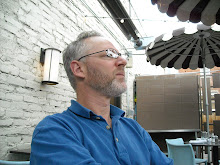I checked out Detours last fall because I'm always up for a non-corporate cuppa, and because the over-the-top enthusiasm of its young owners made it nearly impossible to stay away. I found the place sparsely, even uncomfortably furnished, but they had great comfort food such as breakfast burritos and burgers.
On my second visit, the coffee was free. The new business plan: having become profitable on the food, Detours would give coffee away in exchange for a promise to "pay it forward" and do something nice for somebody else. The owners were fond of saying that somebody tiled somebody else's bathroom after receiving a cup of their coffee.
My third visit was my last. Even if I fully intended to do something nice later, I felt too uncomfortable taking the freeby. They staunchly refused to accept money for the coffee. Actually paying, it turns out, is not an acceptable means of paying forward.
More disturbingly to my sense of liberalism, I was turned off by the clientele the free-coffee offer had, perhaps predictably, attracted: homeless men. H1N1 panic was in full force, and one of the consequences of living in a country that rations health care is having to keep oneself in a constant state of semi-quarantine. The men looked sick, and I didn't want to be in a room with them.
Detours clearly had fans -- here they are on Facebook -- but with fans like these, who needs enemies? Today the place is shuttered (actually not even shuttered -- trash bags line the picture windows), the shop's own Web site has gone dormant, and the phone is disconnected. The beaming owners have been beamed away. Confusing values with value seems to have doomed a hopeful Colfax Avenue business.
